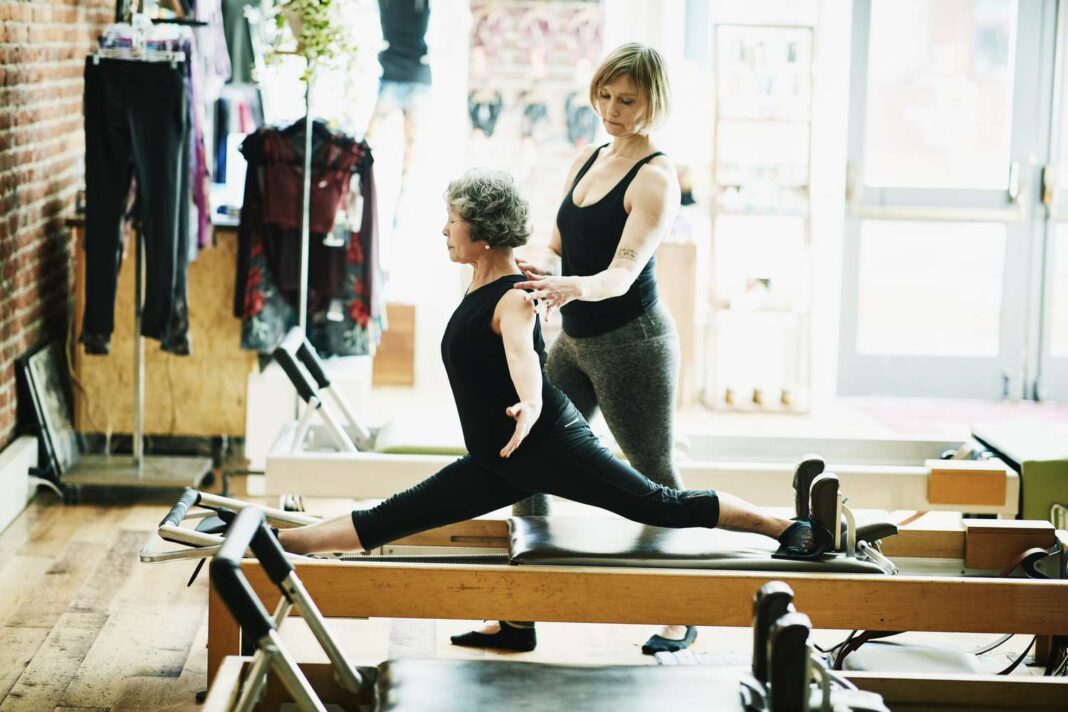Improving Health with Pilates
1. Improves Bone Density
Pilates provides an effective strengthening workout that improves bone health. This low-impact workout focuses on building strength through controlled, repetitive movements. In addition to strength, Pilates improves flexibility and posture.
A 2015 study found that people who participated in a regular Pilates program experienced increased bone density. Better bone density lowers the risk of fractures and osteoporosis (progressive bone loss). Study participants also reported less pain and better quality of life.
2. Improves Posture
Pilates exercises help improve posture through muscle strengthening and body awareness. Improved posture helps to prevent back pain and headaches. Pilates is a whole-body workout that focuses on core strength. A stronger core acts as a brace for the body and helps to bring more awareness to the postural muscles.
3. Improves Balance
People who practice Pilates tend to have better balance. This is especially important for older adults to prevent falls. Fall-related injuries are a serious health concern for older adults. Physical exercise can improve strength and lower the risk of falls.
A 2016 study found that Pilates is an effective way to lower the risk of falls in people who have gone through menopause. Pilates helps to build strength and flexibility, making mobility easier.
4. Improves Mobility
Pilates improves mobility and flexibility in older adults. Mobility refers to the range of motion in a person’s joints, which affects how easily they can walk and move about their day. Flexibility refers to the degree to which a muscle can stretch.
Balance and strength are important factors for good mobility. Pilates focuses on slow, controlled movements that have been found to improve strength, flexibility, and mobility.
5. Prevents Injuries
Following a Pilates workout plan may lower your risk of future injuries. People who practice Pilates participate in dynamic strengthening exercises, resulting in more strength and improved mobility. If you have a current injury, talk with your healthcare provider before starting a Pilates workout regimen.
6. Decreases Back Pain
Pilates builds core strength by including exercises that target the deep abdominal muscles. These core muscles stabilize the torso, putting less strain on the back muscles and lowering the risk of chronic back pain. A 2023 review found that people with chronic low back pain who regularly practiced Pilates experienced less back pain.
7. Improves Cognitive Health
In addition to physical health, Pilates may improve cognitive health (thinking, memory, and problem-solving). A 2016 study found that people with multiple sclerosis who participated in a Pilates program experienced improved cognitive function, executive thinking, and memory.
8. Boosts Immunity
Practicing Pilates may help you to ward off germs. Older adults who practice Pilates have been found to have better immune system function because of improved blood circulation. Pilates workouts increase the flow of blood and lymph fluid around the body.
9. Increases Energy
Participating in Pilates exercises is a great way to boost energy levels and prevent fatigue. Pilates is a low-impact workout that improves cardiorespiratory capacity and blood circulation. It also focuses on small movements that do not leave you overly fatigued after a workout.
10. Increases Energy
Pilates may also improve energy levels because of its effects on sleep. A 2020 study found that adults who participated in a Pilates program reported better quality sleep with fewer disruptions. Better sleep helps your body get the rest it needs so that you can feel more energized throughout the day.
Considerations for Older Adults Before Starting
Pilates is a safe and effective workout for most older adults. However, if you have any injuries or physical limitations, consider talking with your primary healthcare provider before starting a new workout routine.
Which Is Better for Older Adults: Yoga or Pilates?
Pilates and yoga are both low-impact workouts that combine strengthening and breathing exercises. Both are beneficial for health, especially in older adults. So which one is right for you?
First, you do not have to choose between yoga and Pilates. You can try both workouts to see which one works best for you. Many yoga and Pilates studios offer a free first class for beginners.
Next, consider your health goals. Pilates is a good fit for people interested in gaining strength, especially core strength. Yoga may be right for you if you’d like to focus on balance and mindfulness.
Finally, consider asking your healthcare provider which type of workout is best for you and your specific health needs.
What About Chair Pilates?
Chair Pilates is a great option for older adults or those new to Pilates. You can use a special Pilates chair, a dining room chair, or any type you have at home.
Chair Pilates allows people with limited mobility to try Pilates exercises with more comfort and support. It may be especially helpful for people with osteoporosis. Sitting in a chair, you can perform slow, controlled movements while breathing deeply.
Chair Pilates may be a good option for people with difficulty getting up from the floor after a mat workout. If you want to try chair Pilates, ask a Pilates instructor for tips or try a free online video.
Summary
Pilates is a low-impact, full-body exercise with several possible health benefits, especially for older adults. Studies have found that people who regularly practice Pilates experience improved bone density and balance. It may also reduce the risk of falls and fractures. People who practice Pilates have reported improved moods and cognition.
Consider visiting a Pilates studio and learning more from a certified instructor. If you have chronic health problems or physical limitations, talk with your healthcare provider and discuss what is appropriate for you.




